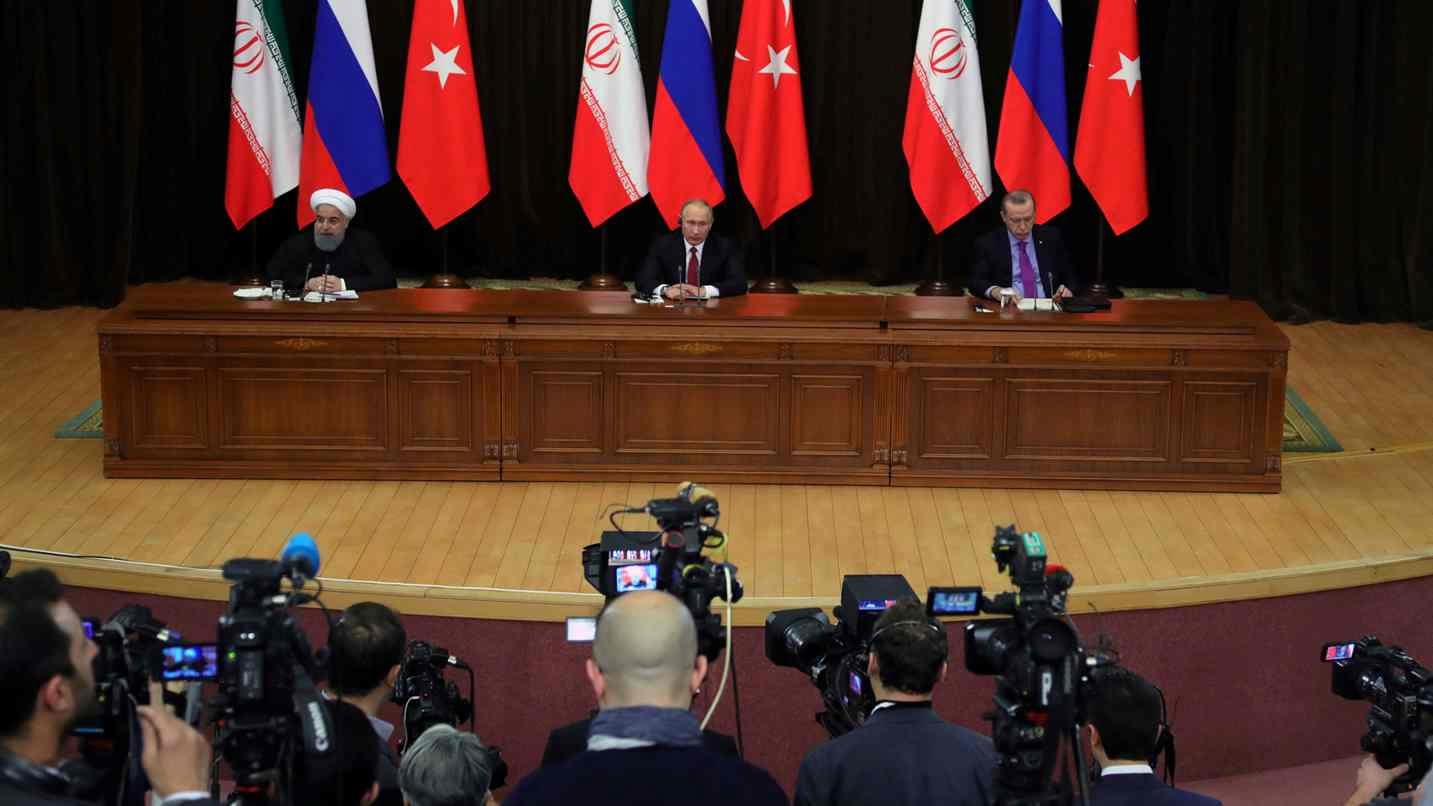
Opinions
21:37, 25-Nov-2017
Opinion: A good start for peace in Syria, with little guarantee for success
Guest commentary by Meir Javedanfar

The trilateral meeting recently hosted by Russian President Vladimir Putin in Sochi with his Iranian and Turkish counterparts was important for a number of reasons.
One key reason is that it showed that the most powerful players involved in the pro-Assad side of the Syrian conflict want to participate in the process of finding a political solution. This is especially true for Russia and its head of state President Putin who among other things stated that for the process to succeed "compromise and concessions from all parties, including obviously the Syrian government" are needed.
This is a promising statement and the meeting was a promising start, however for it to succeed much work and compromise will be needed, with little guarantee for success.

Russia's President Vladimir Putin (C) walks with his counterparts Recep Tayyip Erdogan of Turkey (L), and Hassan Rouhani of Iran (R) after a joint news conference in Sochi, Russia, November 22, 2017. /Reuters Photo
Russia's President Vladimir Putin (C) walks with his counterparts Recep Tayyip Erdogan of Turkey (L), and Hassan Rouhani of Iran (R) after a joint news conference in Sochi, Russia, November 22, 2017. /Reuters Photo
An important critical success factor will be the inclusion of all Syrian minority groups, and the political and even the militant groups which represent them.
Right now, there is no guarantee that this will happen.
In fact we have already hit a major roadblock in this regard, as according to the Guardian the President of Turkey is "insisting Syrian Kurds are excluded from the congress on the grounds that the Kurds are linked with Turkish Kurdish groups that Turkey says are terrorists". The group in question is the Peoples’ Democratic Party and its armed wing, the Peoples’ Protection Units (YPG), which was a key fighting force in the US lead coalition to fight ISIL.
Despite valid opposition to this group's ties with the outlawed PKK Kurdish group, without its presence at the talks an important group of Syrian Kurds will not be represented. Leaving the YPG out could risk future instability in areas populated by Kurds in northern Syria after a deal has been reached.
As well as other minority groups, the views and concerns of neighboring countries who are not part of the talks, as well as the US and the EU will also have to be taken into consideration. To say that this will be a difficult task is an understatement. However for the sake of stability in Syria any settlement must include the security concerns of all neighboring countries, including Israel. Allowing Iranian forces to build bases on Syrian soil near the border with Israel could be a recipe for war and instability in the future, as Iran's most powerful man Ayatollah Khamenei has repeatedly called for the destruction of Israel.
The concerns of the EU and the US concerns will also have to be considered, otherwise who will pay for Syria's reconstruction? Both Iran and Russia are currently under US sanctions.

An Israeli soldier sits atop a tank and his comrade stands nearby in the Israeli-occupied Golan Heights, close to Israel's frontier with Syria, November 22, 2017./Reuters Photo
An Israeli soldier sits atop a tank and his comrade stands nearby in the Israeli-occupied Golan Heights, close to Israel's frontier with Syria, November 22, 2017./Reuters Photo
The other challenge is to meet the stated goal by President Putin's plan calling for "adoption of a new constitution, and, on the basis of that, the holding of elections under United Nations supervision". The question remains: Would President Assad be willing to leave office if he loses? Here again it's unclear and with no guarantees.
Iran, a key country in this process and an ally of Assad has insisted, including recently, that removing President Assad is considered a “red line”. Therefore there are valid concerns as to whether Iran would agree to a Syrian President who is not Assad or an Alawite. At the same time, it is not clear that the opposition in Syria is willing to drop its demand that Assad not be allowed to take any part in the political process, including the political transition period. Despite valid claims pointing to major human rights abuses, Assad who represents at least part of the Alawite minority should be allowed to stand for elections as a candidate, should Alawites decide so.
China, as an economic superpower and a permanent member of the UN Security Council, can play an important supporting role, first by fully supporting the diplomatic process. This could be done by sponsoring meetings. Also by ensuring the recent Sochi meeting's call for the organization of a "congress" which involves the Syrian government and opposition forces is complementary to the existing UN-sponsored Geneva process, not permanently parallel or contrary to it. For the diplomatic process to succeed, the two tracks will have to be merged.
Second, China could become a partner in the all-important task of reconstructing Syria after a political settlement has been reached. This is especially true in sectors such as water security.
The 2006 drought in Syria was partly responsible for fomenting the civil war in 2011, while the 2009 drought in Iraq created a fertile ground for ISIL recruitment. Without political as well as water security, extremist and terrorist groups could be back to haunt all of us in the region, again.
(The author is an Iranian-born Israeli Middle East analyst. He teaches at the Interdisciplinary Center (IDC) Herzliya and is a research fellow at the Meir Ezri Center for Persian Gulf Studies at Haifa University. The article reflects the author’s opinion, not necessarily the view of CGTN. )

SITEMAP
Copyright © 2018 CGTN. Beijing ICP prepared NO.16065310-3
Copyright © 2018 CGTN. Beijing ICP prepared NO.16065310-3